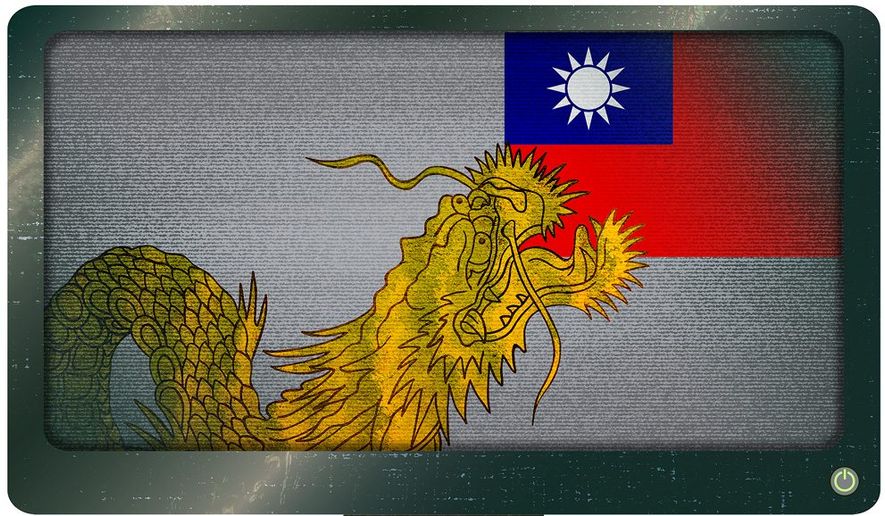OPINION:
TAIPEI and SHANGHAI -- Taiwan’s political class is nervous, yet again. I am in Taipei to speak on whether U.S.-China strains endanger Taiwan. I think not. Certainly, President Donald Trump, Shinzo Abe in Japan and Scott Morrison in Australia — three key countries for Taiwan — show no sign of reduced support. A slew of lesser Asian countries may hesitate to help Taiwan in a crisis, but all prefer a separate Taiwan to the island being swallowed into the People’s Republic. Such a disaster would bring the greatest change in East Asia’s balance of power since the second world war.
Consider that during seven decades of Washington-Beijing ups and downs, Taiwan was unscathed. Today, the island is more prosperous and confident of its identity than ever. Its existence is a textbook case of deterrence working. Thanks, Uncle Sam and Japan.
Economic stagnation on the mainland, which is quite possible, would not destabilize Taiwan. Political crisis in the mainland, much less likely, would harm Taiwan because of the flight of urban Chinese from Shanghai and other cities. Yet, leaving aside gyrations in U.S.-China relations and non-stop military calculations of both the PLA and Pentagon, demographic trends and tricks, and the stealth and reach of social media, could together destroy Taiwan as a democracy without a shot being fired.
Population totals favor China. Russian people are a drop in the bucket alongside Chinese. Siberia faces a Chinese population surge, as Russia’s birth rate and economy lag China’s; Russia’s economy is one-eighth the size of China’s. Australia, with only 23 million people, may become a Chinese-flavored nation, as it once was British-flavored.
Taiwan is more vulnerable than Russia, Australia or many others to demographic games. Sichuan Province (90 million) has four times the people in Taiwan (23 million). It would take only a tiny slice of the young males there, or equivalent numbers from Taiwan’s close neighbor Fujian Province (40 million), if “encouraged” by Beijing to go to Taiwan as “tourists,” then marry Taiwan girls — to produce a demographic reset of Taiwan’s democracy. No submarines or soldiers required.
Subjectively, one feels Taiwan’s vulnerability when flying from Shanghai to Taipei; from communism to capitalism — yet fewer minutes than a hop from Chicago to Boston.
China cleverly uses the web to further a world future for socialist authoritarianism. Professor Hsu Chien-jung of National Dong Hwa University in Taipei began his research on Beijing’s electronic assault by asking a question: Why do huge numbers of Chinese individuals subscribe to Facebook when Beijing blocks Facebook for PRC Chinese? How many Americans know that millions of Chinese adherents to Facebook are physically in Taiwan? These selected “Taiwan folk” are a fifth column devised by Beijing. They spout Beijing’s policies to Facebook “friends.”
Political influence is the tip of a seismic social iceberg. Culture and technology give youth new enjoyments, as they offer China new weapons. Reality looks different to teen-agers than to their parents; youth make their own reality and others will try to make it for them. “You may think you’re talking to a pretty lady or a handsome man,” says Mr. Hsu, “but it’s a robot somewhere, spitting out opinions.”
With a new Chinese app called Zao, a kid may fix her head on the body of a sports hero or pop star and say whatever she likes. A “Jimmy Lai face” can opine day and night that Taiwan belongs to China (not the Hong Kong media magnate’s real view). Who speaks; Who listens? We don’t know, even in a world where anything goes and almost everything is presumed known.
George Orwell wrote of Big Brother controlling a society. China could be a Global Big Brother electronically shaping international public opinion. Easy for selected Communist whiz-kids in Shanghai to reset minds, say in Vietnam, via the Internet. Much simpler than Beijing sending tanks and an army across the China-Vietnam border.
A rising power is always tempted to push the envelope. The United States, like China, is an “unconscious empire,” often unwitting about its huge reach. Since 1945, Washington has trespassed on other countries in its own way. Today, timing offers China the Internet as a perfect tool to do the same and more.
In recent years, PRC money has bought its way into Taiwan media. The Taiwanese newspaper the China Times, says scholar Hsu, “seems to be a representative of Xinhua [the CCP news agency] in Taiwan.” It is a giant step beyond print, to target individuals in Taiwan by invisible, deniable, anonymous electronic tricks. Reading a book or newspaper is an act initiated by an individual from below. The Internet, from above — from somewhere — makes the individual a target.
Taiwanese President Tsai Ing-wen, who hankers for Taiwan independence, fears a huge, if under the table, effort to vote her out of power in January. True, the CCP has overreached before in its 70 years in power, regretting it later (and to be fair, fake voices are less horrible than real bombs). Beijing has shown with its Confucius Institutes that Chinese soft power can backfire. It may overreach on Taiwan, as it already did in Hong Kong. However, it is a fact that tidy millions of pro-CCP Chinese youth are in the world vanguard of IT.
If this spooky stuff ultimately becomes a free speech issue, the West will prevail. If it is won on high-tech skill, not so clear. Internet attacks peacefully entering Taiwan living rooms 24 hours a day may consign submarines and soldiers to the museum. If this becomes the war of the future, asks Daniel Hahn in the Spectator, “can we ever have peace again?” Numbers and technology, linked, are a formidable weapon.
• Ross Terrill’s books include “Mao” and “The New Chinese Empire.” His next book is “From the Bush to Tiananmen” (Rowman and Littlefield).




Please read our comment policy before commenting.